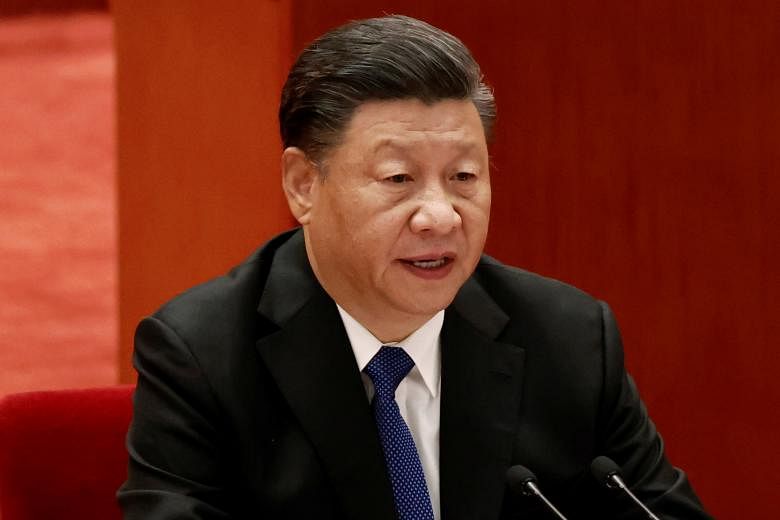BEIJING - Reunification with Taiwan "will be and can be realised" as China strides towards national rejuvenation, Chinese President Xi Jinping said on Saturday (Oct 9), the eve of the self-ruled island's national day.
Peaceful reunification is in the best interests of both the mainland and Taiwan, he said in a televised speech on the 110th anniversary of the 1911 revolution which overthrew the last Qing emperor and led to the founding of the Republic of China in 1912.
The Xinhai Revolution in 1911 also led to a search for the path to national rejuvenation.
"Compatriots on both sides of the Taiwan Strait should stand on the right side of history and join hands to achieve China's complete reunification and the rejuvenation of the Chinese nation," Mr Xi said.
"Those who forget their heritage, betray their motherland, and seek to split the country will come to no good end," he said, adding that "the Taiwan question is purely an internal matter for China, one which brooks no external interference".
"The complete reunification of our country will be and can be realised," Mr Xi declared.
He said that the Taiwan question arose out of the weakness and chaos of the Chinese nation, and will be resolved as national rejuvenation becomes a reality.
The Kuomintang had fled the Chinese mainland in 1949 after losing the civil war to the Chinese Communists and retreated to Taiwan, where it continued its claim to be the legitimate government of the whole of China, under the name Republic of China.
Mr Xi, who had earlier set the target date of 2049 for national rejuvenation, said on Saturday that this had become a historical inevitability.
The Chinese leader's remarks came against the backdrop of heightened tensions across the Taiwan Strait, with the People's Liberation Army sending its aircraft for five straight days into Taiwan's air defence zone. The sorties began on Oct 1, National Day on the mainland, and peaked on Monday when the mainland sent 56 planes, breaking the daily record for such missions.
Mr Xi's remarks on Saturday though appeared to be less bellicose than those on July 1 when, in a major speech to mark the centenary of the Communist Party of China, he vowed to "smash" any attempt at formal independence by Taiwan.
Assistant Professor Dylan Loh, who studies Chinese foreign policy at Nanyang Technological University, said: "The key takeaway... is the clear emphasis on peaceful reunification and the absence of any threatening belligerent words indicating the use of force."
Prof Loh pointed to the upcoming 20th National Party Congress next year as a reason for the Chinese leader to dial down the heat between China and the United States - Taiwan's most important international backer and arms supplier. Taiwan is a flashpoint between the two superpowers.
"Mr Xi's priority... is in ensuring a smooth party congress, especially if he seeks to extend his grip on power beyond the traditional 10 years," said Prof Loh.
"It would not be in China's and Mr Xi's interests if the US sprang a surprise on Taiwan in the lead-up to the 20th congress," he added.
Reacting to the Chinese leader's remarks, Taiwan's presidential office said mainstream public opinion on the island is very clear in rejecting China's "one country, two systems" model.
Taiwan's Mainland Affairs Council also called on China to abandon its "provocative steps of intrusion, harassment and destruction".
Taiwan President Tsai Ing-wen, speaking at a pre-national day reception at an airbase in Hsinchu city, thanked the armed forces for protecting the island, but did not mention the tensions with China.
"We will continue to work hard to hold fast on the front lines of democracy and freedom," she said.


